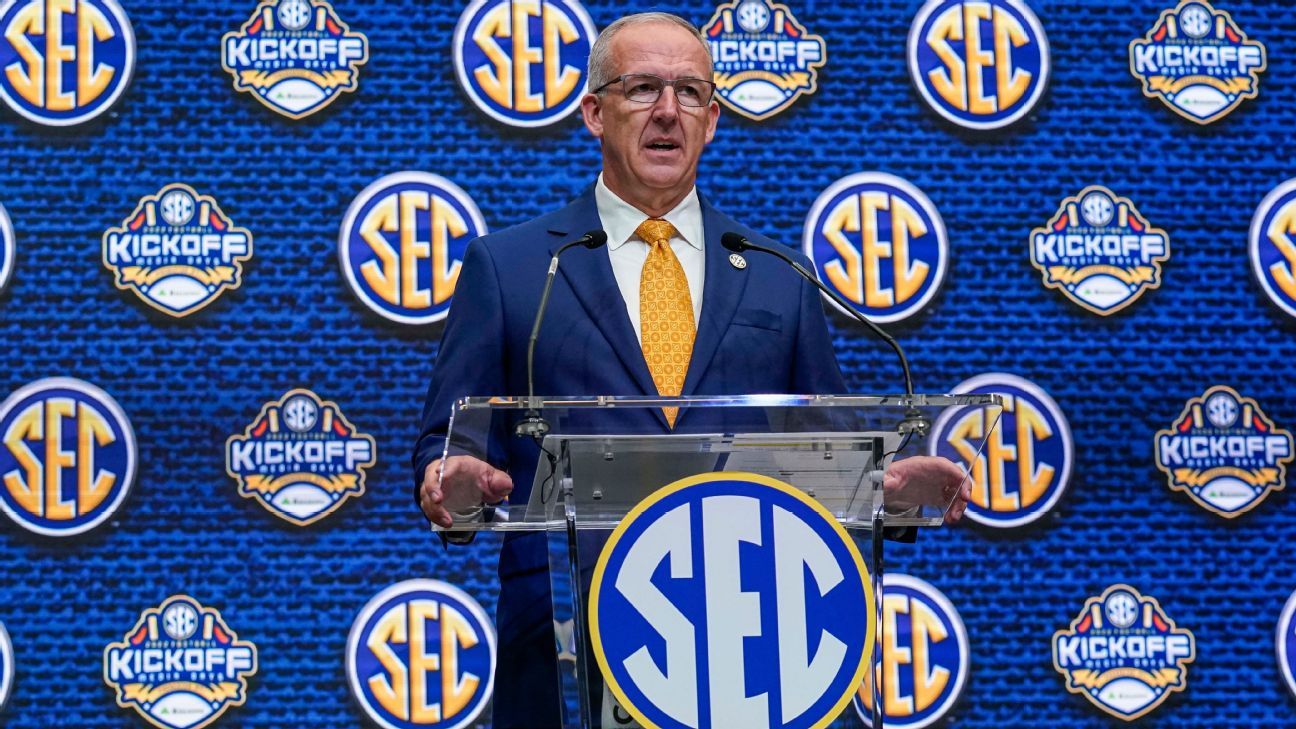Sankey: Little SEC role in Freeze, Petrino hires

LOS ANGELES — Two recent high-profile coaching hires in the SEC have received public backlash and raised questions about the optics they present, but commissioner Greg Sankey said Sunday that the conference played a limited role in the processes and that the hiring decisions were made at the campus level.
1 Related
Sankey spoke to a small group of reporters Sunday morning following the final media availability for TCU coach Sonny Dykes and Georgia coach Kirby Smart before the College Football Playoff National Championship on Monday at SoFi Stadium (7:30 p.m. ET, ESPN). Asked whether he had concerns about the public perception of those hires, Sankey was clear in his expectations for both coaches.
“I want the people leading and participating in our programs to meet the expectations of the rules and how they conduct themselves, period,” he said, “and to represent their university and this conference well. Period.”
In a separate interview with ESPN, Sankey said the SEC is focused on its growth to 16 members, which includes the arrival of Big 12 co-founders Oklahoma and Texas in 2025, but he remains “keenly aware of conversations” around him regarding conference realignment.
“I tried to take a responsible approach knowing that we created disruption in the summer of ’21,” he said. “So we’re focused on the move of Oklahoma and Texas into the SEC in ’25. It’s clear to me the issues around conference-membership movement haven’t just settled. I’m going to be fully attentive and engaged knowing what’s going on around me. That doesn’t predict that we’re going to go beyond 16, but I’m also keenly aware of conversations.”
Sankey reiterated that the timing of the eventual arrival of Oklahoma and Texas into the SEC remains between those schools and the Big 12.
“That’s really for them to speak of,” Sankey said. “This is about contractual relationships between the Big 12 conference and Big 12 members, period. We would have to go back through an adjustment to our invitation. That’s us, but that is likely much less complex than the issue the Big 12 has to deal with. I just have to figure out a football schedule, but we’ve known that.”
Sankey was also asked about a recent proposal by the LEAD1 group that there should be one person in charge of college football. LEAD1, which represents the 131 athletic directors in the FBS, in November proposed appointing a chief operating officer of college football who would report to a proposed FBS football governing board.
“The observation that’s been made doesn’t acknowledge the reality of differences and disparities and diversity that are present in Division I college football,” Sankey said, “So what you’re asking is, is the Southeastern Conference willing to submit its decision-making fully to some individual that’s unknown and undefined without any discussion of how that happens, and the answer is no.”
Last month, the NCAA announced that former Massachusetts Gov. Charlie Baker will become the organization’s next president in March. Sankey said the job description of the next NCAA president was six pages long. (“I mean, literally,” he said with a laugh, “I had to take a nap in the middle of it.”) Sankey said there is not one specific topic for Baker to address “that will solve all the problems” because the NCAA and its organization is complex and there are external expectations and pressures that are different from what faces the government.
“I would say for Gov. Baker it’s obviously to pivot quickly from leading a state to leading an incredibly diverse association at its most challenging time, at least in modern history, and to help bring people together to find solutions that make certain we have a breadth of support for college athletics while providing great opportunities,” Sankey said.